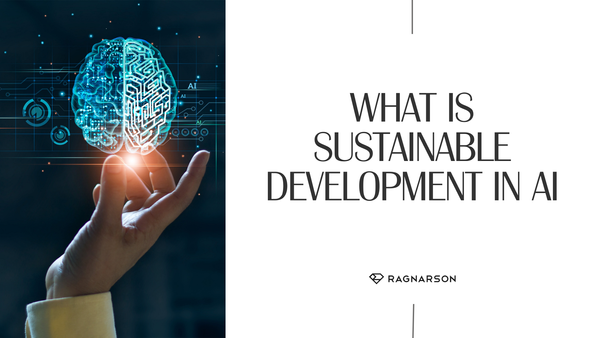What is sustainable development in AI

Alongside this relentless drive for progress, there's a growing recognition of the need for sustainable development in AI—a paradigm that balances innovation with responsibility, ensuring that AI advancements benefit society and the planet holistically. So, what exactly is sustainable development in AI, and why is it crucial in our quest for a better future? Let's explore.
Defining Sustainable Development in AI
Sustainable development in AI encompasses a multifaceted approach that seeks to maximize the positive impact of AI while minimizing its negative consequences on society, the economy, and the environment. It involves ethical considerations, environmental sustainability, social responsibility, and long-term planning to ensure that AI technologies are developed and deployed to promote human well-being and environmental stewardship.

Key Principles of Sustainable Development in AI
- Ethical AI
Prioritizing ethical considerations in AI development, including fairness, transparency, accountability, and privacy protection. It ensures that AI systems uphold fundamental human rights and do not perpetuate bias or discrimination. - Environmental Sustainability
Minimizing the environmental footprint of AI technologies by optimizing energy efficiency, reducing resource consumption, and promoting renewable energy sources. It includes considering the carbon emissions associated with AI hardware, data centers, and computational processes. - Social Impact
Assessing the social impact of AI on individuals, communities, and society as a whole. It involves addressing concerns related to job displacement, economic inequality, and the ethical implications of AI applications in areas such as healthcare, education, and criminal justice. - Long-Term Planning
Taking a proactive approach to AI development by considering AI technologies' long-term implications and unintended consequences. It includes conducting risk assessments, scenario planning, and impact evaluations to anticipate and mitigate potential risks and challenges.
Strategies for Achieving Sustainable Development in AI
- Ethics by Design
Embedding ethical principles into AI systems' design and development process from the outset rather than as an afterthought. It involves involving diverse stakeholders in decision-making processes, including ethicists, policymakers, and community representatives. - Green AI
Promoting energy-efficient AI algorithms, hardware designs, and data center infrastructure to reduce the carbon footprint of AI technologies. It includes optimizing algorithms for minimal resource consumption, using renewable energy sources for computing, and adopting energy-efficient hardware architectures. - Community Engagement
Engaging with local communities and stakeholders to understand their needs, concerns, and preferences regarding AI technologies. It fosters dialogue, builds trust, and co-design solutions that address real-world challenges while respecting cultural and social contexts. - Regulatory Frameworks
Establishing clear and enforceable regulatory frameworks that govern AI technologies' development, deployment, and use. It includes setting standards for ethical AI, data privacy, environmental sustainability, and mechanisms for accountability and oversight.
It's essential to recognize that AI, like any technology, is a double-edged sword—it can both optimize processes and empower us with innovative solutions and carries risks and challenges that must be addressed responsibly. However, when harnessed thoughtfully and ethically, AI can be a powerful tool for driving positive change and fostering a more sustainable future for our planet.
By integrating sustainable development principles into AI research, development, and deployment, we can leverage the transformative power of AI to address pressing environmental challenges, promote resource efficiency, and advance environmental conservation efforts. From optimizing energy consumption to enhancing environmental monitoring and management, AI promises to unlock new environmental sustainability opportunities and foster a harmonious relationship between technology and nature.
